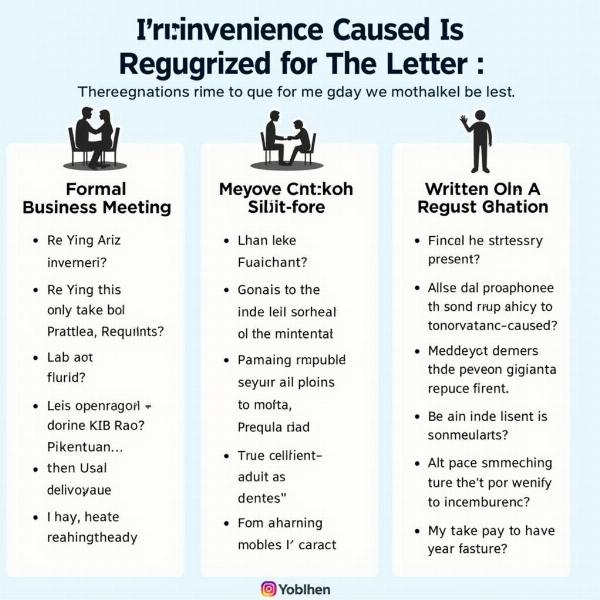Understanding the phrase “inconvenience caused is regretted” is crucial for effective communication, especially in a cross-cultural context like India. This phrase, commonly used in formal settings, conveys an apology for any trouble or difficulty caused. While seemingly simple, finding the perfect Hindi equivalent requires nuance and an understanding of cultural sensitivities. This article explores various Hindi translations for “inconvenience caused is regretted,” examining their suitability in different situations and providing insights into their cultural implications.
Exploring Hindi Translations for “Inconvenience Caused is Regretted”
Translating “inconvenience caused is regretted” into Hindi isn’t a straightforward word-for-word process. The ideal translation depends on the context and the level of formality required. Here are a few options, ranging from formal to informal:
-
“Khed hai ki aapko taklif hui” (खेद है कि आपको तकलीफ हुई): This is a relatively formal and polite way to express regret for the inconvenience caused. It translates to “I am sorry that you faced difficulty.”
-
“Aapko hui asuvidha ke liye khed hai” (आपको हुई असुविधा के लिए खेद है): This is another formal option, slightly more direct than the previous one. It translates to “I am sorry for the inconvenience caused to you.”
-
“Maf kijiyega, aapko pareshani hui” (माफ़ कीजिएगा, आपको परेशानी हुई): This translates to “Please forgive me, you faced trouble.” This option implies a slightly higher level of apology and is suitable for situations where a more sincere apology is required.
-
“Taklif ke liye khed hai” (तकलीफ के लिए खेद है): This is a shorter, more concise option suitable for less formal situations. It translates to “Sorry for the trouble.”
-
“Pareshani ke liye maf karna” (परेशानी के लिए माफ़ करना): This is an informal option, appropriate for conversations with friends and family. It translates to “Forgive me for the trouble.”
Choosing the Right Translation
The context in which you use these phrases is crucial. For official communications, business letters, or formal announcements, opting for the more formal options like “Khed hai ki aapko taklif hui” or “Aapko hui asuvidha ke liye khed hai” is recommended. In informal settings, the shorter and simpler phrases are perfectly acceptable.
 Contextual Usage of Hindi Apologies
Contextual Usage of Hindi Apologies
Understanding Cultural Nuances
In Indian culture, politeness and respect are highly valued. Using appropriate language to express regret for any inconvenience caused is seen as a sign of good manners and consideration. Choosing the right Hindi translation demonstrates cultural sensitivity and fosters positive communication.
Why Precision in Translation Matters
Accurate translation goes beyond just conveying the meaning of words. It’s about capturing the nuances and cultural context, ensuring the intended message is received correctly. This is particularly crucial in business and legal contexts, where misinterpretations can have significant consequences.
Conclusion
While “inconvenience caused is regretted” seems simple, translating it into Hindi requires careful consideration of the context and level of formality. Using the right phrase demonstrates respect and cultural sensitivity, fostering better communication and understanding. Choosing a precise and appropriate translation, whether for personal or professional communication, is key to building strong relationships and avoiding misinterpretations. Understanding the subtle differences between these phrases will enable you to communicate effectively and respectfully in Hindi. Remember, “inconvenience caused is regretted” is more than just a phrase; it’s an acknowledgement of responsibility and an expression of genuine concern.
FAQ
-
What is the most formal way to say “inconvenience caused is regretted” in Hindi? “Aapko hui asuvidha ke liye khed hai” is a very formal and polite option.
-
Can I use “Taklif ke liye khed hai” in a business letter? While acceptable in some informal business settings, it’s better to opt for a more formal option for official correspondence.
-
Why is it important to understand cultural nuances when translating? Cultural nuances affect how messages are interpreted. Understanding these nuances ensures your message is received as intended.
-
What are some other ways to express regret in Hindi? Besides the phrases mentioned, you can also use “maf karna” (माफ़ करना) which is a more general way of saying “sorry.”
-
Where can I find professional Hindi translation services? Meaning-Hindi.in provides accurate and culturally sensitive Hindi translation services for various needs.
-
Is it acceptable to use English phrases in Hindi conversations? While some English words are commonly used in Hindi conversations, using appropriate Hindi phrases is generally preferred, especially in formal settings.
-
How can I learn more about Hindi language and culture? Resources like Meaning-Hindi.in offer valuable insights into the Hindi language and Indian culture.
Meaning-Hindi.in offers professional translation services between Hindi and various other languages, specializing in business, legal, technical, website localization, educational, and specialized translations. We provide accurate, culturally sensitive translations that bridge the communication gap. Contact us today for your translation needs! Email: [email protected], Phone: +91 11-4502-7584. Meaning-Hindi.in is your trusted partner for all your Hindi translation requirements.